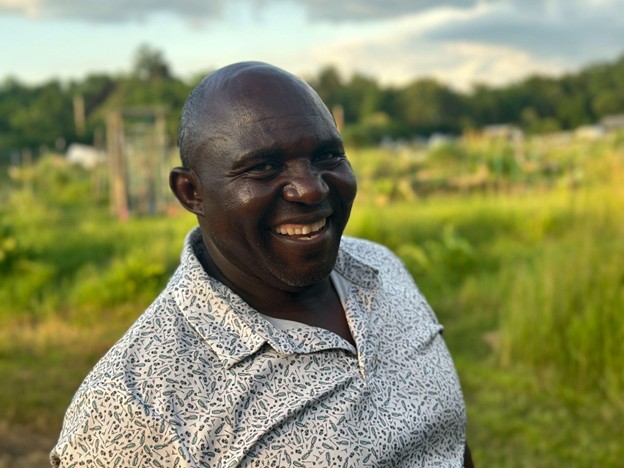Aoma Muma, an experienced and culturally rooted farmer of Bombeta Farms, will become the ninth farmer leasing land with Grow Food Northampton and the first to be offered a housing opportunity right by the farm.
Photo credit: Grow Food Northampton
NORTHAMPTON — Grow Food Northampton, in collaboration with the Northeast Farmers of Color Land Trust, has announced a new selection to join GFN’s community of farmers and land stewards through a community-centered land matching process.
For the first time in Grow Food Northampton’s 15-year history, the opportunity to lease land on the GFN Community Farm has been offered together with access to housing.
Grow Food Northampton owns and stewards the 121-acre Grow Food Northampton Community Farm where they lease low-cost farmland to up to 10 small farms as well as runs a 320-plot organic Community Garden. Add in their weekly farmers market as well as other roles in helping bridge access to organic and locally sourced food with the public and its mission of creating a just and resilient local food and farming system, one that nourishes the community and protects and enriches the environment, becomes very clear.
“We at Grow Food Northampton, for years now we’ve wanted to be able to offer housing to farmers that we lease land to because one of the big barriers to farming for a lot of people is that they can’t live close by their farmland, especially in the Northampton area, because housing costs so much,” explained Grow Food Northampton Co-Executive Director Alisa Klein. “Farmers often don’t make a lot of money for a very noble and necessary profession. We had long been hoping that a house near the community farm would go up for sale. We were hoping there was some kind of way that we could create the opportunity for farmers who were leasing land to either rent or just to live close by the farm.”
Aoma Muma of Bombeta Farms, an experienced and culturally rooted farmer was chosen by the collaborative due to his demonstrated farming experience, entrepreneurial growth and commitment to community well-being.
Adjacent to Grow Food Northampton’s 121-acre farm at the junction of Spring and Meadow Streets in Florence, the so-called “Mushroom House,” notorious for its distinctive 1970s architecture, has long been viewed by GFN organizers as a potential site of accessibly-prices farmer housing.
When the two-family home came on the market in 2022, longtime GFN board member Gaby Immerman contacted NEFOC-LT, which activated existing relationships with reparations funders in the region to acquire and renovate the property, recognizing the rare opportunity to pair stable, affordable housing with long-term land access.
“We were just gobsmacked and so excited and one of the things that Gaby wanted to do was do this in partnership with a black farming organization that she had developed a deep relationship with and that is the New England Farmers of Color Land Trust. So, she essentially introduced us to the folks at NEFOC and we have over the last couple of years worked very hard to create a trusting relationship with them so that we were able to hand in hand offer this opportunity to a farmer of color,” added Klein.
Muma and Bombeta Farms will be the ninth leasing farmer currently working through Grow Food Northampton. NEFOC will manage the housing where Muma and family will live while GFN will manage the farmland.
“It’s this beautiful partnership where our two organizations come together, committed to shared values around this idea of offering a place to live to a farmer,” said Klein. “We could offer the land, and essentially, they could offer the housing. That’s how that relationship was born and we’re very grateful to Gaby Immerman for helping us through all of this.”
The effort addresses a pressing need: farmers in Massachusetts, particularly those from communities strategically marginalized by the mainstream food and farming system, face major barriers in securing both affordable housing and farmland.
Unaffordable housing prices combined with minimal farm income means most of the farmers who lease land on Grow Food Northampton’s Community Farm can’t afford to live near their leased land and have to commute considerable distances. By pairing farmland with housing access, this project offers a powerful model for food sovereignty, the fair housing movement and land justice.
Klein added that Grow Food Northampton hopes to be able to offer more housing opportunities like this for its leasing farmers in the future.
According to the Massachusetts Food System Collaborative, the state has lost 77%, or 1,491,000 acres of farmland since 1940. The loss has created significant competition for and greatly increases the costs of remaining farmland to the point where owning farmland, a key component of generating capital for farm growth, is out of reach for the majority of new and beginning farmers. Coupled with systemic racism, BIPOC farmers have particularly limited access to farmland.
“That is kind of the origin story of Grow Food Northampton. These two parcels of farmland, 180 acres of farmland, were up for sale and it was fairly certain that a developer would purchase it and build houses on it,” added Klein. “This loss of farmland would essentially mean that we don’t have a place to grow food for our community. So, by preserving this acreage and creating the community farm and Grow Food Northampton, we were able to have this prime farmland that we could offer to farmers.”
This new opportunity at Grow Food Northampton was designed and offered in partnership with NEFOC-LT, whose mission is to return land to then stewardship of Indigenous, Black and other farmers of color. The partnership reflects both organizations’ commitment to advancing equity, food sovereignty, and ecological stewardship while fostering thriving local food systems and honoring the sacredness of land.
Klein added leases are offered on a sliding scale fee from $0 to market rate allowing individual farmers to vary on what they can afford to contribute as they farm on the land.
“This is a model that Grow Food Northampton has created, and we prioritize farmers of color and other farmers coming from communities that have been marginalized historically and currently by the conventional food system, by the traditional food system,” said Klein. “So, we’re doing everything we can to offer people farmland when the resources for that are dwindling in this state.”
Originally from Kenya, Muma comes from a lineage of small-scale farmers and began his U.S. farming journey growing vegetables simply to feed his family. In 2011, he joined the World Farmers program in Lancaster and steadily grew his operation from a small family plot to a 19-acre commercial enterprise.
Today, Muma owns and operates Bombeta Farms which carries a strong presence in both wholesale and farmers markets across eastern Mass. His farming specializes in growing culturally significant vegetables such as amaranth, chinsaga and managu, in addition to Asian and Japanese crops, locally common vegetables and pumpkins.
“It’s very important that people can get these ethnic crops grown locally,” said Muma. “That way, families can keep their culture alive and teach the next generation the important food traditions that make them unique.”
Beyond production, Muma is deeply engaged in mentorship and peer learning. He credits an elder Hmong farmer as a pivotal influence and has since taken on a mentorship role himself, supporting other growers in navigating the farming landscape across the state.
“Aoma Muma is more than a farmer, he is a steward of culture, a mentor to others, and a leader in the regional food system,” said Mandana Boushee, NEFOC staff member and a representative from the Land Matching Committee. “We’re thrilled to welcome him to this site and excited for what his presence will mean to the broader community.”
Klein said that Muma has been seeking to move his operations to Western Mass. and this was his first parcel purchased in the area. She added Grow Food Northampton hopes to find him additional farmland so he can move all of his operations in the region and be closer to his family based out of Springfield.
This initiative reflects Grow Food Northampton and NEFOC’s shared vision for equitable land access and resilient food systems. By pairing land and housing, this collaborative effort sets a precedent for how communities can address both the farmland access and housing crises, while uplifting farmers of color as essential leaders in our agricultural future.
“I think what’s also kind of a unique collective kind of farming model, that Grow Food Northampton is able to offer, is farming resources for farmers and mutual support of farmers. By having different farms all on one community farm, they can help each other out, they can share tools and other resources. Grow Food Northampton is able to supply them with a tractor and other tools with irrigation, with a shared water source.”
Klein continued, “So, this model is pretty unique in that it offers all these resources to farmers in once place and also gives them the opportunity to share their knowledge from one another and their personal resources and tools with one another. That’s something that a lot of farmers don’t get to experience. I think farming can be very isolating for farmers and their families and this model of farming at a community farm just offers people a lot of camaraderie and support.”



